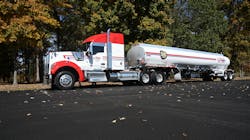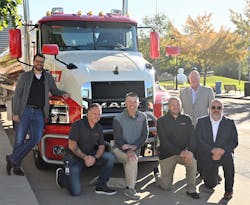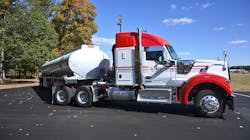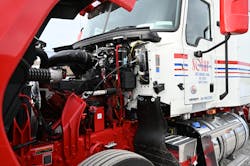Extinction evasion: Solar evolves to ensure survival
Solar Transport’s leaders see the sun setting on refined fuels.
It might not happen tomorrow, in 10 years, or even 20, they agree, but a previously improbable transformation now feels inevitable after New York followed California’s lead in declaring its plan to ban the sale of gasoline-powered vehicles by 2035—and the consequences can’t be ignored.
“In today’s world, refined fuels have an expiration date,” said Christian Stanley, director of risk management, safety, and compliance at Des Moines, Iowa-based Solar, which was founded as a fuel hauler in 1963. “We’re sort of an endangered species right now.
“I believe we’ll still see refined-fuel operations for several decades, but at what level?”
To ensure Solar’s survival, Kyle Krause, chairman and CEO of parent-company Krause Group, Solar president Tom Jones, and their team targeted diversification, leading to the creation of a chemical division last November. After a successful pilot secured ownership’s support, they ramped up operations this year, and aim to double the division’s size each of the next two years as part of an aggressive expansion strategy.
Solar’s objective is to reach $50 million in annual chemical-hauling revenue this decade—and $250 million overall.
“It’s already growing faster than we anticipated,” said Joe Fangmann, Solar controller.
Chemical conception
William “Bill” Krause, Kyle’s father, and Tony Gentle founded Sole Transport, which operates as Solar (Sole is Italian for sun) in Hampton, Iowa, to haul “liquid dinosaur” for Hampton Oil, their gas station that developed into Kum & Go (‘K’ for Krause, ‘G’ for Gentle). The convenience store chain today boasts 400-plus locations in 11 Midwest states; and Solar serves it and other customers, like Phillips 66 and Murphy’s, with 120 tractors, 150 trailers, and 200 drivers from four “brick-and-mortar” terminals and 16 satellite locations in 15 states.
The tank truck veteran entered the industry as a driver and rose through the ranks with Kenan Advantage Group, Trimac Transportation, Dupré Logistics, and Atlas Oil, where he served as vice president of transportation before joining Solar in July 2020, bringing with him experience hauling fuel and chemicals, which come with higher profit margins. National Tank Truck Carriers’ 2022 market analysis shows chemicals account for 11.2% of tank truck tonnage, but produce 28.8% of the segment’s revenue. Refined fuels, conversely, add up to 51.8% of all tank truck loads, while generating only 33% of the revenue.
“Bulk chemicals are more profitable, and they’re significantly more sustainable,” Jones said. “The chemical industry as a whole in the U.S. is increasing at 5% to 7% every year. They’re building plenty of new chemical plants. They’re not building any new [large] refineries in the United States, and they haven’t in a long time.
“Electric vehicles are the future—whether we like it or not.”
With this new world in mind, Jones felt Solar had to expand beyond refined fuels to avoid going the way of the dinosaurs, and his team determined in long-range planning chemicals were the logical starting point. Jones said Solar also will open a food-grade division within the next two years but avoid other bulk commodities, like cement and sand, or cryogenic gasses, to simplify equipment usage.
“I don’t want ultra-specialized trailers,” he said. “I’m a DOT 407/406 guy. I can use them in many different aspects of what we do.”
Division’s inception
Once the decision was made, Jones began reaching out to contacts, offering Solar’s services, and gauging opportunities. Then the company started a pilot with one core customer and a handful of leased trailers that demonstrated the division’s potential to win new business, and help Solar not only survive, but thrive. Most importantly, they convinced Kyle an investment in new drivers and equipment was worthwhile.
“We have 100% of his buy-in to grow the overall operation to a 500-driver fleet,” Jones said.
Solar’s chemical division now includes seven Mack trucks and 11 Brenner and LBT tank trailers in dedicated service to a handful of customers. Fangmann estimated they currently move approximately 400,000 gallons, or 60-70 loads of chemicals—like heptane, hexane, pentane, rovine, latex, and lubricating oil—per month.
Launching a new division hasn’t come without difficulties. Solar guaranteed pay when loads were inconsistent early on, Fangmann said. They also had to satisfy novel insurance and customer training requirements, coordinate new staging locations, and work with vendors to maximize the uptime of their limited equipment. “You get smarter every day about what’s working and what’s not,” Fangmann said. “So there have been a few bumps in the road along the way, but it’s been far more positive than negative.”
Business proliferation
The positives include an additional $2 million in lube oil business secured in late September, Jones reported. And to ensure the division continues to flourish, they’re taking a driver-centric approach to expansion, while working toward Responsible Care Partner certification through the American Chemistry Council.
“We’re looking at the quality of the freight, rather than the quantity,” Jones said.
The average length of haul is 600 loaded miles, and Solar isn’t backhauling, so most drivers are home every other day and weekends. “We’re out and back, and drivers love it,” Jones said. “They’re not going to a bunch of tank washes.” Stanley said it’s also important to remember leaders still are managing people, even with today’s technologies, so effective training and communication are key, and Luma’s learning management system is assisting with both. “We’re still a people business, so we have to engage our people,” he said.
In addition to keeping drivers safe—Solar earned a Merit Award in NTTC’s 2020 Competitive Safety Contest in the 7-12.5-million-mile class—Stanley is leading Solar’s efforts to secure the Responsible Care certification many chemical manufacturers require by 2024. Solar has a sponsor, and now is updating internal policies to reflect Responsible Care Management System (RCMS) requirements, and educating its employees. “In the petroleum market, Responsible Care isn’t a term,” Stanley said. “So we have to explain to everyone what that means, because it has to be ingrained throughout the organization.”
Growth projection
With a sound, market-driven strategy, staunch support, and safe practices, Jones is confident he can develop solar into a $250 million operation, despite current challenges, including inflation, the driver shortage, and the rise of EVs. It’s on track to hit $90 million annually with its largest customer, Kum & Go, and aiming for $10 million per year in new third-party business, which Jones said they achieved in 2021 and will again this year. He’s also factoring in at least one acquisition of a “40-to-50-truck fleet” within the next 18 months.
“We’re already in some preliminary discussions on the bulk chemical side,” he said.
Solar already is expanding its footprint, too, with new operations in Detroit, Michigan; Minneapolis, Minnesota; and Salt Lake City, Utah. Jones said they’ll be in Grand Rapids, Michigan in December and Boise, Idaho next year; and he expects to convert a building in Des Moines owned by Krause+ into a shop in 2023.
His greatest concern, at this point, is equipment availability.
“I’ve got 20 bulk chemical trailers on order for next year and they keep getting pushed out further,” Jones said. “And I’ve got 10 new tractors for the chemical division scheduled for delivery in December and January that were pushed from October and November, and I’m not certain they’ll be here in January.”
But uncertainty isn’t upending their plans. “The biggest lesson we’ve learned from this is if you want to grow, you can’t be afraid to put those purchase-order commitments out there,” Fangmann said. Jones concurred, saying he was too conservative early in the pandemic—and refuses to be caught empty-yarded again.
“We’ve done everything we need to do to position ourselves to take advantage of the market next year,” Jones concluded. “We’re going to be the company that has the new trucks and trailers—and best in driver pay.
“We will be successful. I have no doubts.”
About the Author
Jason McDaniel
Jason McDaniel, based in the Houston TX area, has more than 20 years of experience as an award-winning journalist. He spent 15 writing and editing for daily newspapers, including the Houston Chronicle, and began covering the commercial vehicle industry in 2018. He was named editor of Bulk Transporter and Refrigerated Transporter magazines in July 2020.




